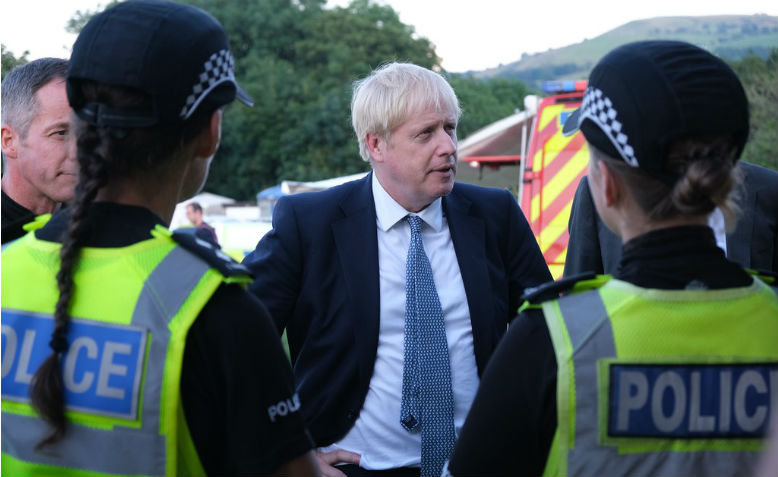 Boris Johnson visiting Whaley Bridge, August 2019. Photo: Flickr/Number 10
Boris Johnson visiting Whaley Bridge, August 2019. Photo: Flickr/Number 10
As ever, Boris Johnson’s gung-ho attitude is designed to distract, writes Eleftheria Kousta
In a letter published in the Daily Mail, Boris Johnson has pledged to introduce a number of measures to shore up the law and order regime. His main promises are staff increases in the police department by 20,000 over the next three years, expanding the prison network by 10,000 places, increasing in-prison security, expanding Stop-and-Search, and allocating £85 million to the the Crown Prosecution Service.
These are hollow promises. First of all, the PM’s pledges, excluding the Stop and Search operations, are not radically different from the policies and budget allocation already in place. For example, the addition of 10,000 new prison places was already a target in 2015 for 2020. Moreover, these additional places are needed to accommodate the existing prison population that exceeds capacity by 8,700. Reform in legislature of the time-span of sentences is also meaningless as judges already have the power to hand down longer sentences. On police numbers, Boris Johnson’s proposals will only partly restore police levels and civilian security resources to pre-Conservative levels.
Statistics show that crime levels have actually declined compared to previous decades. The press obsession with them is as much about eye catching headlines as it is about real trends. Office of National Statistics figures show there has been an increase in violent crime over the last four years, and the widespread perception of a spike in crime is also partly a product of the obvious effect of police cuts. However, will the proposed measures be effective in tackling criminal activity and endemic violence?
Almost certainly not. Boris Johnson proposes the adoption of draconian punitive measures without any evidence and with little apparent interest in addressing the root causes. As former Deputy Mayor Mathew Ryder QC argues, the approach the PM is taking is not-evidence based and is likely to cause more damage rather than improving the situation. There is a debate around police levels and the decline in crime rates. Some argue that there is no link between the two and others like London Mayor Sadiq Khan argue that more police officers are urgently needed. However, there tends to be a consensus relating to the ineffectiveness of Stop and Search operations by researchers. Stop and Search were even dialled down by the cabinet of Teresa May.
The Home Office itself issued an extensive report in 2011 assessing the impact of Stop and Search, concluding that it did not have a significant impact on crime rates. Despite making ‘law and order’ more immediately visible in the streets, its ill-effects outweigh any perceived benefits. The over-expansion of Stop and Search is widely associated with the unjustified racial profiling of black youth and has in the past been a central factor in the breakdown of trust between the community and the police. Boris Johnson should be well aware of that as the Home Office report was released when he was serving as the Mayor of London.
If Boris Johnson keeps his promises, he will be investing public money on a failing strategy. It is widely accepted that measures that work on crime reduction are not punitive but preventative. Under Tory austerity youth outreach and public health programs have been slashed by 70% making it even harder for local councils and community centers to engage with disenfranchised youth and tackle some of the causes of problematic behavior and criminality. Since 2010, 1000 SureStart Centers have been shut down and public resources are dwindling. The positive impact of investing in the community and family intervention has been well documented by studies published in the Department of Education that used UK-wide examples to identify measures that actually work in crime prevention early on. This included Intensive Supervision and Support Programmes, Youth Inclusion and Support Panels, and after-school recreational clubs. One of the best examples is Glasgow which prior to 2005 was named the ‘knife capital’ of the UK. A programme of expanding community services and resources for young people rapidly helped to curb violent crime. Most experts agree it is this kind of approach that is needed elsewhere.
Boris Johnson’s approach is designed to make him look tough and decisive and to divert attention from more pressing issues. His disregard of the evidence indicates that actual, long-term results are not what he is after. The danger is of course that his approach will increase tensions in our communities and lead to the further stigmatization of young people, particularly from ethnic minorities.

